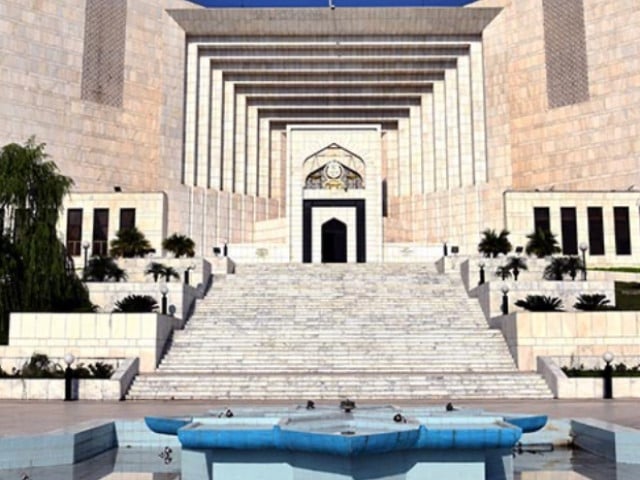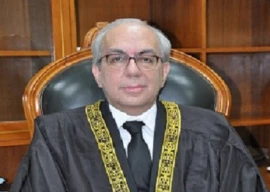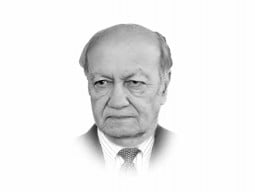
As if matters were not heated enough among judges of the Supreme Court, the temperature may increase further after the refusal of the senior puisne judge, Justice Syed Mansoor Ali Shah, to attend the meeting of the three-judge committee working under the Supreme Court Practice and Procedure Act 2023.
Justice Shah has also refused to sit on the larger bench hearing the review petition against the judgement on the interpretation of Article 63-A of the Constitution.
On the other hand, the committee, led by Chief Justice of Pakistan Qazi Faez Isa, has included another likeminded judge on the larger bench after Justice Shah's refusal.
It is an open secret that the relationship of CJP Isa with the SC's two senior most judges, Justice Shah and Justice Munib Akhtar, has been tense since the July 12 short order in the reserved seats case.
Following this order, the government lost two-thirds majority in parliament. CJP Isa was in minority in the judgement.
There was no dissent reported on the part of Justice Shah in any meeting of the committee before the July 12 order. Lawyers are now left wondering why the outcome of this case has affected the CJ's relationship with the two senior judges.
Now the situation within the SC is worse after the amendments in the SC Practice and Procedure Act, 2023, through an ordinance. There is the impression that Justice Munib Akhtar was the target of that ordinance as he was immediately excluded from the committee.
CJP Isa listed 11 reasons for Justice Munib's exclusion in the committee and raised questions over his conduct.
At the same time, CJP Isa did not respond to Justice Shah's demand to summon a full court meeting to consider the ordinance and its implications on the independence of the judiciary.
Even a few constitutional petitions have been filed in the SC against the ordinance, but are still pending without the allotment of numbers.
CJP Isa, following the practice of his predecessors, is depending on likeminded judges, a term often used during the tenure of former CJP Umar Ata Bandial. It was earlier believed that no one could predict a judgement after the formation of a bench during CJP Isa tenure. However, the formation of a larger bench in the Article 63-A review petition has negated this statement.
Now all eyes are on the majority judges and whether they will remain silent or evolve a joint strategy against the ongoing situation in which pressure is being mounting on independent judges by internal and external elements.
Despite the demand, CJP Isa is not convening a full court meeting. Now it will be interesting to see whether the majority judges will also demand CJP Isa summon a full court meeting. On the other hand, Pakistan Tehreek-e-Insaf (PTI) lawyers are organising a big protest outside the SC premises on Wednesday (today). The protest will certainly affect judicial politics.
PTI, through Advocate Ali Zafar, has objected to the composition of the larger bench as it was not formed by a three-member committee. Zafar, on behalf of Imran Khan, has filed an application in the apex court wherein it is stated that it is evident from Section 2(1) of the Act that the committee in question is a three-member collegiate body.
"The rationale for entrusting the responsibility of bench formation to such a collegiate body is to ensure that three independent minds are engaged in the decision-making process. Only after the collective consideration of these three individuals can benches of the Supreme Court be constituted, and cases be fixed before them.".
The application states that it is a matter of public record that Justice Syed Mansoor Ali Shah, one of the three members of the committee, was not present at the so-called committee meeting held on September 23, 2024, during which it was decided by the Chief Justice and his nominee to schedule the titled review petition before the current bench.
Consequently, the decision to fix the titled review petition before the present bench does not constitute a decision of the committee as required under Section 2(1) of the Practice and Procedure Act. This is due to the fact that only two members of the committee were present at the said meeting, and the full membership of the committee was not in attendance.
"It is imperative to emphasise that the Practice and Procedure Act does not allow the formation of benches or fixation by only a subset of the committee. Therefore, the decision to constitute the current bench and assign the review petition before it is corum non judice," the application read.
"The applicant submits that the present bench is constitutionally disqualified from hearing this application and the titled review petition, as doing so would violate the fundamental principle of nemo judex in causa suathat no one should be a judge in their own cause. This principle is enshrined in Articles 4 and 10A of the Constitution of Pakistan, 1973, as well as in the doctrines of natural justice and fair play.
"The decision to fix the review petition before the current bench was made by the chief justice and his nominee at the purported committee meeting on 23-09-2024. Both the CJ and his nominee are members of the bench currently seized of the matter. Since their decisions are the subject of challenge in this application, the Constitution, law, and principles of propriety demand that they recuse themselves from adjudicating upon their own decisions."
The application prayed that the SC direct that the review petition be fixed before a bench duly constituted in accordance with Section 2 of the Supreme Court (Practice and Procedure) Act, 2023, by the full committee.
"Direct that the instant application and the titled review petition be fixed before a bench that is not disqualified from hearing the matter, as articulated in paragraphs 6-7 above. Further direct that the instant application and the titled review petition be fixed before a bench duly constituted in accordance with Section 2 of the Supreme Court (Practice and Procedure) Act, 2023, by the full committee as envisaged therein."



1724584050-0/Untitled-design-(2)1724584050-0-165x106.webp)
1727685355-0/BeFunky-collage-(21)1727685355-0-165x106.webp)









1724268870-0/Supreme-Court-of-Pakistan-(2)1724268870-0-270x192.webp)







COMMENTS
Comments are moderated and generally will be posted if they are on-topic and not abusive.
For more information, please see our Comments FAQ